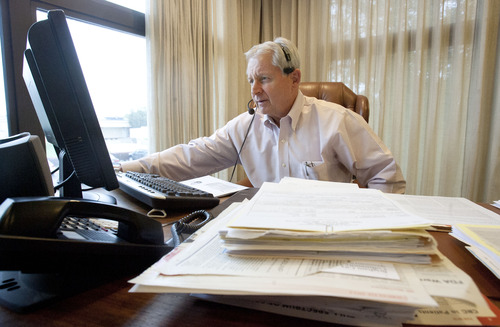This is an archived article that was published on sltrib.com in 2012, and information in the article may be outdated. It is provided only for personal research purposes and may not be reprinted.
UTOPIA's promise to drive economic development in Brigham City by way of a high-speed fiber-optic network has yet to bear much fruit in the northern Utah community known for its plentiful peach harvest.
In 2002, officials jumped at the chance to join UTOPIA and install the network's costly infrastructure under city streets, viewing it as a way to keep up to date and to attract high-tech businesses.
But now the Box Elder County community faces years of bond debt obligations. Some residents have had liens placed on their homes and find themselves unable to keep up with the service's cost.
For this city of 18,012 residents, the future price tag could reach nearly $16 million.
In late 2009, nearly 1,200 Brigham City homeowners signed on for $3,000 liens against their properties, part of a special assessment area set up to fund user connections to the fiber that winds through 92 percent of the 14-square-mile city.
"I was so worried about the people who had signed up," said RuthJensen, who has served on the Brigham City Council for five years.
"Many were elderly citizens who I felt got taken," Jensen said. "They were so loyal to the city and wanted to help out."
According to UTOPIA, 23 percent of residents with access to the fiber-optic cable subscribe to the high-speed Internet service, while only 11 percent of Brigham City businesses have done so.
Although subscribers are scarce, at least one likes the service.
"It gives us much higher speed Internet connections," said Joseph Hillam, a gastroenterologist who works in an office building tied into the network.Brigham City Mayor Dennis Fife noted Internet speeds have been "fantastic" but said customers found phone and television service that providers bundled with it to be inadequate.
"I was in favor of the technology but not how Brigham City was handling it at the time," said Fife, who took office in 2010 espousing anti-UTOPIA sentiment.
In mid-2011, Brigham City joined Utah Infrastructure Agency,
a sister agency set up to borrow additional money after UTOPIA had reached its bonding limit. The city joined seven others that pledged future franchise taxes to service up to $60 million in additional debt."We were essentially told we needed to sign or it would never succeed," Fife said, blaming UTOPIA management for poor planning and continued shortfalls.
Twitter: @catmck



